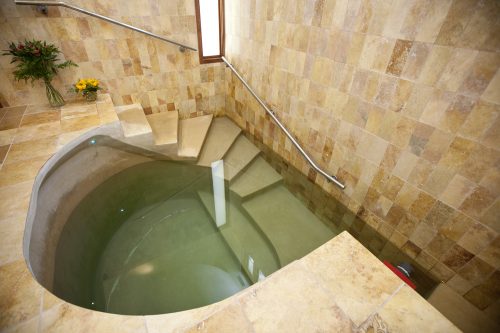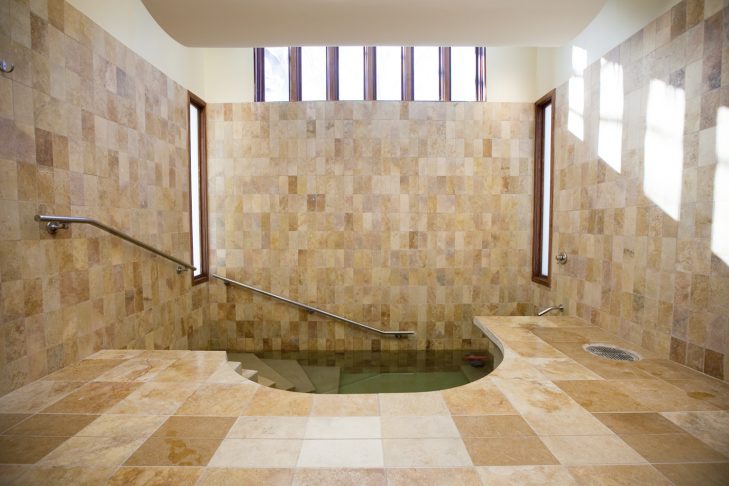Among the first things you take in at Mayyim Hayyim, Boston’s community mikveh, is the purposeful beauty of the place. That beauty is made all the more unique by the smell of fresh water, the air of joyous anticipation, the holiness of ritual. It is a place in which serenity and energy naturally mingle.
On Thursday, June 9, Mayyim Hayyim Living Waters Community Mikveh and Paula Brody & Family Education Center will celebrate an evening of “Milestones: Step by Step.” The event will highlight Mayyim Hayyim as a mikveh, or ritual bath, that in keeping with Jewish law has repurposed an ancient ritual for 21st-century Jewry.
Housed in a lovely renovated house adjacent to Temple Reyim in Newton, Mayyim Hayyim opened its doors in 2004. Since then 16,000 immersions have affected lives in a sacred, private and safe space, commemorating weddings, conversions and other lifecycle events.
Ritual and learning go hand in hand at Mayyim Hayyim. Through its educational center, Mayyim Hayyim sponsors over 100 programs a year, featuring experiential and text learning in equal measure. A gallery space presents art exhibitions that enhance the exquisiteness of the mikveh experience.
Mayyim Hayyim was originally established to address an increasing need for non-Orthodox conversions to take place in a warm, welcoming mikveh. Founding president Anita Diamant asserts, “There are more people converting to Judaism today than in the past 2,000 years, and I felt the welcome we were providing them was not adequate and not beautiful.” Diamant speaks from personal experience. In the early 1980s she accompanied her husband, Jim Ball, to his conversion in a setting she felt was too drab to welcome a new Jew to the fold. The scene stayed with her, and a decade later Diamant wrote a groundbreaking essay about her hopes and dreams for what would become Mayyim Hayyim. She wrote, in part:
“I want a mikveh that encourages the prayers of the heart in Jews of every denomination and description. Thus I want a mikveh that is kosher in every dimension, that follows all Halachic requirements regarding shape, space, the collection of natural water, maintenance. I want a mikveh that respects the modesty of the people who visit.”
Now entering its 13th year—its bat mitzvah year—of operation, Mayyim Hayyim is very much in the business of fulfilling the commandment of making ritual beautiful and hospitable. The limestone walls, high-end bath products, skylights and art gallery are all part of a commitment that a mikveh is as much a generous place of healing as it is a space to mark lifecycle events.
“Dedicating this year’s event to milestones,” says Carrie Bornstein, Mayyim Hayyim’s executive director, “is an example of slowing down and taking stock of what happens in our lives. This is an inspiring way of thinking about the particular moments in our honorees’ lives and the lives of everyone who comes to Mayyim Hayyim.” Diamant adds: “Mayyim Hayyim is all about milestones. Almost every day there is a milestone here, something new happening in people’s lives.”

This year’s honorees include Paula Brody and Merrill Hassenfeld, who are among Mayyim Hayyim’s founders. The couple will receive Mayyim Hayyim’s Nachshon Award—an acknowledgement that, like Nachshon, the first person willing to cross the Red Sea, Brody and Hassenfeld had an abiding faith in Mayyim Hayyim’s mission from the beginning. In a recent email exchange, Brody wrote: “As a founding board member and ‘mikveh mama,’ I have seen Mayyim Hayyim achieve many milestones. This year marks a personal milestone for me as I transition off the board, knowing that the future is very bright for this gem in the crown of the Boston Jewish community.”
Milestones are what drew Terry Rosenberg and Lauren Neill to Mayyim Hayyim. The mother and daughter, the evening’s two other honorees, immersed at Mayyim Hayyim at different stages in their lives. For Rosenberg, her first mikveh experience was part of her 60th birthday celebration. “I was very excited to take an old ritual and make it new and relevant for contemporary Judaism,” she says. “But what really drew me to Mayyim Hayyim was how it encouraged contemplative practice. Everything about it, from the way one is welcomed to the attitude and warmth of the staff, the whole experience of immersion, including the privacy and the way it invites internal reflection, are among the things that attract me to Mayyim Hayyim.”
Neill’s initial immersion took place before she gave birth to her first child, which she describes as a bonding experience with her mother. “Mayyim Hayyim,” she says, “has been a way for me to exercise my personal spiritual journey as a mother without it feeling particularly ‘religious.’” Rosenberg concurs. “Mayyim Hayyim provides you with meaning without requiring anything more of you than your Jewish identity and your willingness,” she says.
Sarah Fendrick, the event coordinator for the Milestones event, points to Mayyim Hayyim’s guest book as a dynamic and poignant record of the mikveh’s ongoing activities. “People sign the guest book after they immerse,” Fendrick notes. “Every kind of life event and milestone is recorded in the book. I was reading through it the other day and saw entries for weddings, bar and bat mitzvahs, conversions, transitioning to another gender. People also wrote about marking anniversaries, birthdays, graduations, new jobs and healing from illnesses, some of them very serious. Some people write that they have come to Mayyim Hayyim to help them transition to the end of life. They find relief in being able to let go and say goodbye to certain parts of their lives by immersing in the waters.”
Mayyim Hayyim’s ongoing narrative continues to be recorded in its guest book signings. It is a story that moves forward through joyous celebrations and acknowledgements of change and transition and illness. It is a story that, as Brody notes, makes Mayyim Hayyim “an international model for what mikveh can offer to contemporary Jews.”
This post has been contributed by a third party. The opinions, facts and any media content are presented solely by the author, and JewishBoston assumes no responsibility for them. Want to add your voice to the conversation? Publish your own post here. MORE



